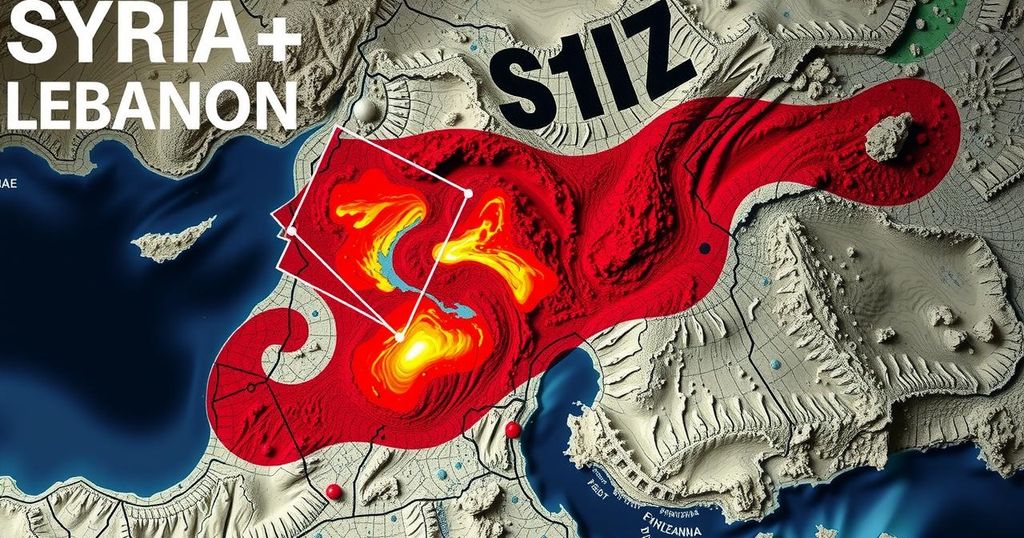Resurgence of Sunni Movements in Lebanon Amid Syrian Political Shifts

The aftermath of the Assad regime’s fall in Syria spurred a revival of Sunni political activism in Lebanon, evidenced by calls for amnesty for Islamist prisoners. This resurgence presents challenges to Hezbollah’s influence as Sunni factions seek to reassert power amidst Lebanon’s struggling political landscape. The political landscape is further complicated by upcoming elections and tensions regarding military control in southern Lebanon, reflecting inherent sectarian divides.
The eventful political landscape in Lebanon has witnessed a significant upheaval following the collapse of the Assad regime in Syria. Initially met with celebrations in Lebanon, particularly among the Sunni community, these sentiments quickly evolved into demands for political reforms. Leading Sunni figures, such as Sheikh Ahmad Shemali, have voiced calls for the release of Islamists imprisoned under terrorism charges, expressing frustration over prolonged detentions and lack of trials. The resurgence of the Sunni community is seen as a challenge to Hezbollah’s diminished influence resulting from its struggles against Israel and the Alawite defeat in Syria.
The plea for amnesty for Islamists complicates the political atmosphere in Lebanon. Given that amnesty is under the authority of the Lebanese parliament’s speaker, Nabih Berri—an ally of Hezbollah—it appears improbable that he would pursue such a measure, which might re-establish Syrian dominance via Sunni factions. This political standoff exhibits the fragility within the wider Lebanese political framework, as Hezbollah grapples with internal weakening and loss of popular support.
Recent meetings, notably between General Joseph Aoun and Hezbollah representative Wafiq Safa, underline Hezbollah’s challenges in retaining its military position, particularly in southern Lebanon. The potential election of an anti-Hezbollah president may pivot the political balance. Moreover, the Christian factions find themselves in a quandary, vying for a compromise candidate in contrast to Hezbollah’s strengthened position due to its historical alliances.
Further exacerbating tensions, Lebanon’s evolving Sunni dynamics in light of a Sunni-led regime in Syria may trigger instability. Past confrontations, especially with groups like ISIS, continue to resonate within Lebanese memory, raising fears of a potential spillover of Syrian unrest. On this note, Ahmad al Sharaa, a prominent leader in the anti-Assad campaign, has assured that his coalition does not plan to interfere in Lebanese affairs, yet the potential for future destabilization remains a pertinent concern.
The intricate political history between Lebanon and Syria continues to pose challenges. The fall of the Assad regime in Syria has rekindled Sunni aspirations in Lebanon, creating a complex dynamic particularly for heavily Shiite factions like Hezbollah. The political power struggles woven into the fabric of Lebanese civic life illustrate the perennial conflicts shaped by sectarian divisions. As Lebanon grapples with internal discord and a shifting regional landscape, the implications of these developments remain far-reaching, affecting not only governance but also societal stability.
In conclusion, the changing political landscape in Lebanon reflects a potent juncture marked by Sunni resurgence, Hezbollah’s waning influence, and the ramifications of the Syrian conflict. The calls for Islamist amnesty signal a growing discontent within Sunni communities, poised to challenge the established political order. Meanwhile, the fragile balance among various factions underscores the precariousness of Lebanese politics, which remains susceptible to external influences, notably from Syria. The outcome of the forthcoming elections and the political maneuvering between Lebanon’s sects will undoubtedly shape the nation’s future dynamics.
Original Source: aurora-israel.co.il





